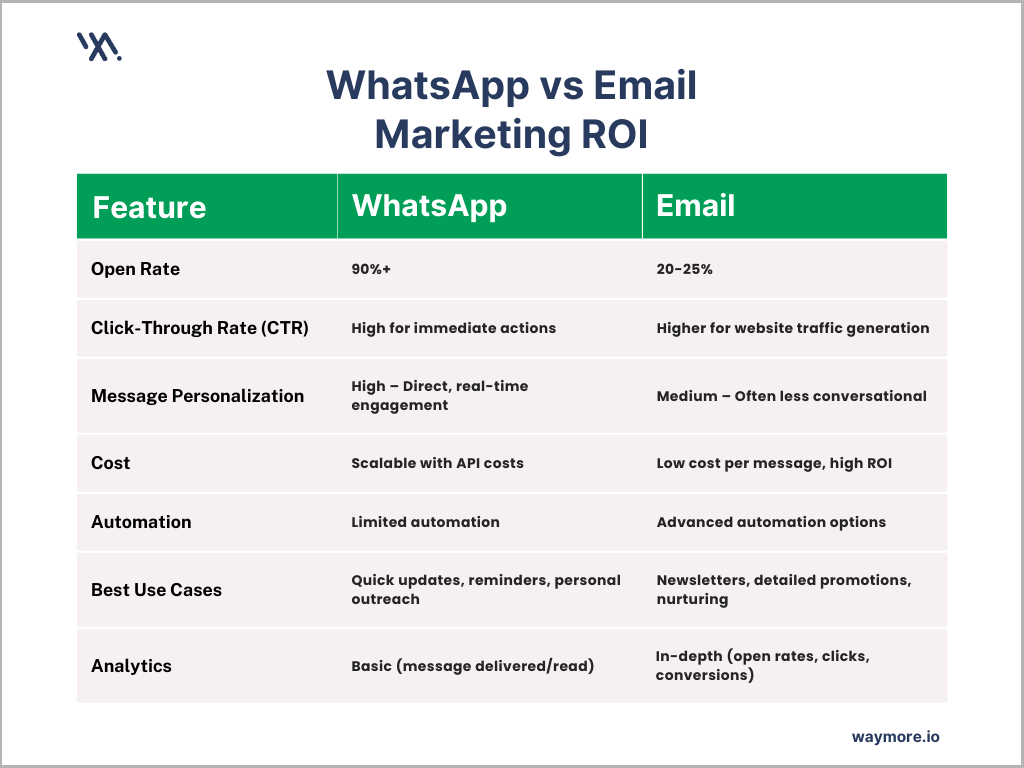Quick Links
Businesses need to choose the right communication platforms to reach customers and drive results. Two leading options are WhatsApp vs Email. Both channels have their strengths, but the key question is: which one delivers better ROI (Return on Investment)?
Let’s compare WhatsApp and Email. We will look at how each platform does in engagement, conversions, and cost-efficiency.
The Rise of WhatsApp Marketing for Businesses
WhatsApp has quickly become one of the most popular messaging platforms worldwide. WhatsApp marketing for businesses is widely used to send direct messages, product updates, and promotions to customers. With over 2 billion users globally, WhatsApp’s reach is undeniable. However, its popularity varies by region, and in the USA, WhatsApp vs Email continues to be a key discussion for marketers.
WhatsApp Broadcast Business Solutions, like WayMore, allow companies to send messages to multiple customers simultaneously. Unlike group chats, Broadcasts keep communication one-on-one, maintaining privacy. More importantly, users do not need to save the business number to receive messages, making WhatsApp Broadcast engagement highly effective.
The Numbers Behind WhatsApp’s Performance
When comparing WhatsApp vs Email, it’s crucial to consider open rates. WhatsApp broadcasts have impressive open rates, often reaching 90% or more. This is significantly higher than email, which averages around 20-25%. This stark contrast in WhatsApp Broadcast vs email open rates gives WhatsApp a clear edge in visibility.
In terms of conversions, WhatsApp conversions can also outperform email marketing. Because WhatsApp offers a more direct and personalized form of communication, customers are more likely to take action, whether it’s making a purchase, booking a service, or responding to a CTA (call-to-action).
Email Marketing Effectiveness
While WhatsApp is growing in popularity, email remains a powerful tool for businesses. Email marketing effectiveness is well-documented, with companies using email to nurture leads, promote products, and engage customers.
Email marketing platforms, like WayMore, offer advanced segmentation options, allowing businesses to tailor their messages to specific audiences. Although email open rates vs WhatsApp are lower, email excels in its ability to deliver longer-form content and more detailed information. Companies that use email marketing can include product catalogs, newsletters, and detailed promotions that might not fit well within the character limits of WhatsApp messages.
The Numbers Behind Email’s Performance
When evaluating WhatsApp vs Email in terms of open rates, email tends to fall short. According to Statista, the average open rate for marketing emails is around 20%, with some sectors performing slightly better. However, email still has higher click-through rates (CTR) in some cases. This makes it a more reliable way to drive traffic to a website or landing page.
In terms of ROI, email is still one of the most cost-effective marketing channels. According to the Data & Marketing Association (DMA), the average ROI for email marketing is $42 for every $1 spent. This strong performance makes email a favorite for marketers. This is especially true for businesses targeting B2B or high-value customers.
Pros and Cons of WhatsApp vs Email
To provide a clearer comparison, let’s examine the pros and cons of both WhatsApp vs Email marketing:
Pros of WhatsApp:
- High open rates: With an open rate close to 90%, WhatsApp ensures high visibility.
- Immediate engagement: Messages trigger notifications, which leads to faster responses.
- Direct and personal communication: Businesses can engage customers on a personal level with more conversational interactions.
- WhatsApp Business Message Reach: You can reach multiple customers at once without creating a group chat.
Cons of WhatsApp:
- Limited reach in the USA: WhatsApp is more popular in Europe and Asia. Its use is lower in the USA. However, in 2023, WhatsApp’s daily active users grew by 9% in the US. This means it reached 100 million users in 2024.
- Manual management: WhatsApp Broadcasts often require more manual effort than automated email campaigns.
- Costs for larger campaigns: With paid API solutions, costs can increase based on the number of messages sent.
Pros of Email:
- Wide reach in the USA: Email remains universally used and understood.
- Scalable: Email marketing allows businesses to send thousands of emails with ease.
- Automation and analytics: Email platforms provide robust automation features and detailed reporting.
- Cost-effective: Email marketing delivers a high ROI, particularly for B2B marketing.
Cons of Email:
- Lower open rates: With only 20-25% open rates, many emails go unread.
- Crowded inboxes: Emails can be lost or ignored in a busy inbox.
- Impersonal communication: Compared to WhatsApp, email can feel more formal and less conversational.
WhatsApp vs Email Marketing ROI: A Comparison Table
Here’s a quick comparison of WhatsApp vs Email marketing ROI based on key performance metrics:

Why Use WhatsApp Over Email?
Businesses choose WhatsApp over email because it drives higher engagement. Customers are less likely to ignore WhatsApp messages or lose them in a crowded inbox. WhatsApp allows businesses to communicate more personally, responding to inquiries in real-time and building stronger connections with their audience.
Another key benefit is WhatsApp Broadcast engagement (how quickly people respond to WhatsApp messages). When a business sends a WhatsApp Broadcast, the message goes straight to the customer’s phone and often triggers a notification. This prompt delivery leads to faster responses and encourages immediate actions, improving customer interaction and satisfaction. By offering direct and quick communication, WhatsApp enhances the overall user experience.
WhatsApp vs Email: The Final Verdict
When deciding between WhatsApp vs Email, businesses should evaluate their specific needs and goals. WhatsApp marketing for businesses is perfect for quick, personalized interactions and high engagement. Its high open and conversion rates make it a strong option for businesses looking to drive immediate results.
However, email marketing effectiveness remains unmatched for companies needing a scalable solution for long-term customer engagement. Email is cost-effective, offers a wide range of content options, and provides detailed analytics to measure success.
Ultimately, choosing between WhatsApp and email depends on your audience, the type of messages you want to send, and the tools you have.
For many companies, using both platforms together works best. WhatsApp offers fast and direct communication, while email provides more detailed content and automated features.
For businesses seeking an all-in-one solution, WayMore offers a platform that combines both WhatsApp and email marketing with other powerful business tools. This makes it easier for companies to manage multiple channels and boost ROI in one place. Whether your focus is engagement or scalability, both WhatsApp and email can support a successful marketing strategy.
FAQs
1. Which platform has better engagement: WhatsApp or Email?
WhatsApp usually has better engagement than email. Messages sent through WhatsApp get opened more often and faster since they show up directly on a person’s phone, often with a notification. WhatsApp Broadcasts can reach up to 90% open rates, while email is typically around 20-25%. If you need fast customer responses, WhatsApp is a good choice. Email works better when you want to send longer or more detailed messages.
2. What are the cost differences between WhatsApp and Email marketing?
Email marketing is generally cheaper, especially for larger campaigns. Most email platforms, like WayMore, let businesses send thousands of emails with automation tools at a low cost. On the other hand, WhatsApp marketing can cost more, especially when using paid services, because the price goes up with the number of messages you send. However, WhatsApp’s higher open rates and quick responses might make the extra cost worth it for businesses focused on fast customer interactions.
3. Can I use both WhatsApp and Email for my business marketing?
Yes, using both WhatsApp and email together can be very effective. WhatsApp works well for fast, personal interactions and getting quick responses from customers. Email, on the other hand, is great for sending longer content and running larger campaigns with automated features. Combining both platforms lets you reach your audience in different ways, helping you cover both quick communication and detailed messaging. For businesses looking for an easier way to manage both channels, platforms like WayMore can help bring everything together in one place, making the process smoother.




